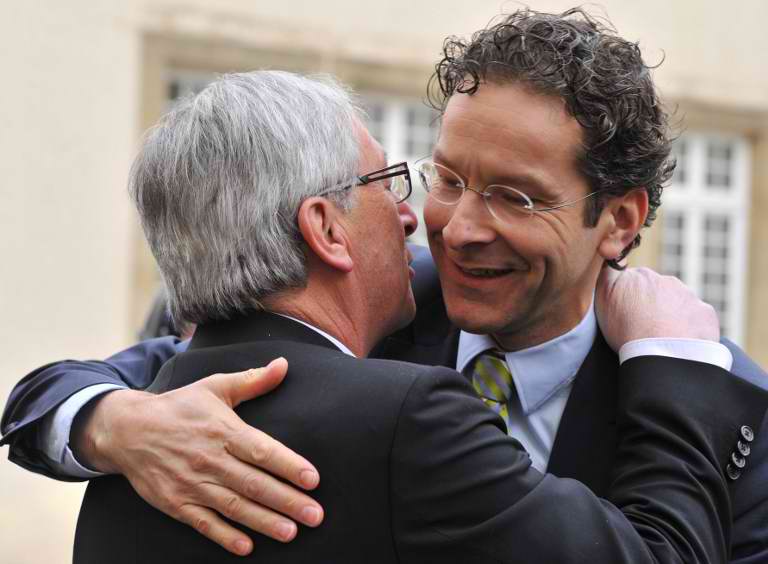SUMMARY
This is AI generated summarization, which may have errors. For context, always refer to the full article.

THE HAGUE, Netherlands – Dutch Finance Minister Jeroen Dijsselbloem’s reputation as an austere bridge-builder will serve him well if, as expected, he becomes the head of the Eurogroup, coordinating deficit-busting policies in the crisis-hit eurozone.
But Dijsselbloem, 46, will have just 11 weeks of ministerial experience on Monday, January 21, when the relative unknown is tipped to begin leading the battle against the 17-member eurozone’s worst crisis yet.
“A staggering strategist,” according to Dutch financial daily the Financieele Dagblad, Dijsselbloem — pronounced ‘day-sell-bloom’ — is also, says the center-left De Volkskrant, “a little stuffy and as loyal as a guide dog.”
Protestant daily Trouw describes the curly-haired minister with a slightly pinched face as “a likeable man behind a mask of rigidity.”
“He’s an affable man in private but always very serious when you talk about work,” said Staf Depla, who along with Dijsselbloem and current Labour leader Diederick Samsom was part of the so-called “Red Engineers.”
The three men took their name from their scientific backgrounds — Dijsselbloem studied agricultural economics in the Netherlands and business economics in Ireland — and campaigned for 2003 elections by visiting low-income neighborhoods and calling for better integration of Muslim immigrants.
Campaigning in appropriately red jumpsuits, the trio shocked the Labour (PvdA) party’s old guard by suggesting that immigrants had duties and should be educated about Dutch society — ideas more usually associated with the far-right.
Dijsselbloem acquired a reputation as a strategist, quietly working away from the limelight, and for years held planning roles within the Labour party.
His focus was on education, healthcare, asylum policy and youth — but not finance or the economy.
In a frank expression of his inexperience, Dijsselbloem on January 19 thanked current Eurogroup head Jean-Claude Juncker for “all the advice he has given me as a newcomer to this financial world.”
Positioned on the Labour party’s right, Dijsselbloem shares his party’s pro-European vision, backing balanced budgets and austerity measures.
He emerged as a compromise candidate because he comes from one of the few remaining top AAA-rated countries, which is also a founding EU member, he is Social Democrat like the government in France and backs austerity like Germany.
Like some other top EU officials, the most remarkable thing about Dijsselbloem is how little known he is, even in the Netherlands.
“Dijsselbloem is a blank page and choosing him as finance minister was a surprise because he’s never had a financial profile as a politician,” said Bas Jacobs, economist at Rotterdam’s Erasmus University.
Dijsselbloem was born in the eastern city of Eindhoven, into a largely apolitical family.
His political awakening came aged 15 when he took part, against his parents’ will, in a protest against a Cold War missile installation in 1983.
He was raised in a Catholic environment and many of his family members, including his parents, grandmother, uncle and aunts, were teachers.
Before becoming minister, Dijsselbloem was best known in the Netherlands for arguing in parliament for less violent music videos on MTV, acquiring the nickname of “moral knight.”
A father to a teenaged son and daughter, Dijsselbloem has cited Dutch left-wing wartime leader Wiardi Beckman, who died in Dachau after being arrested by the Nazis in 1942, as his greatest political inspiration.
He is also an admirer of trumpet great Miles Davis and of British comedy series “Monty Python’s Flying Circus.”
In an interview at the end of December, Dijsselbloem told De Volkskrant that as finance minister he was “Father Christmas in reverse.”
“Because I have to make sure that no presents are handed out, and that everyone pays up on time,” he said of the unenviable role that he will now have to bring to bear upon the eurozone. –Rappler.com
Add a comment
How does this make you feel?
There are no comments yet. Add your comment to start the conversation.